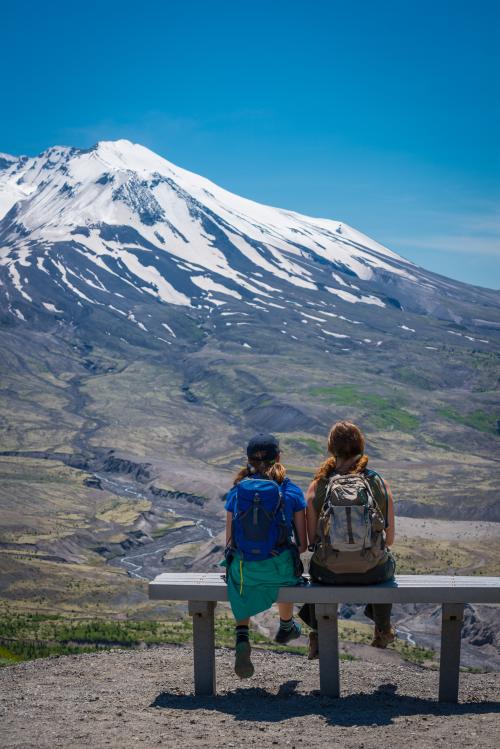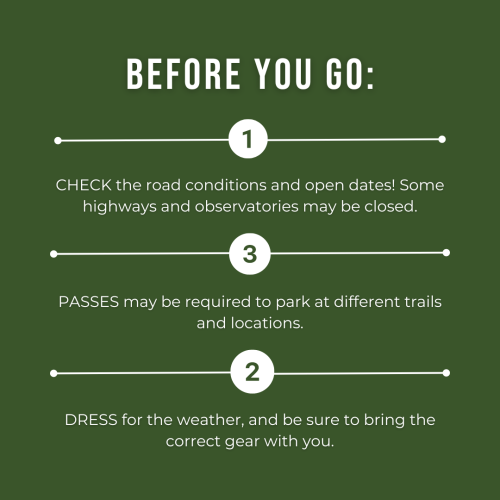Mount St. Helens
The Mount St. Helens area offers adventurous day trip activities during every season. Just an hour and a half drive from Vancouver WA, get your fix of unbelievable views and natural beauty.
Due to a landslide in 2023 that damaged the access road, the Johnston Ridge Observatory will be closed until the latter half of 2026, but there are plenty of other ways to see this impressive volcano.
Visitor Centers and Educational Opportunities
Mount St. Helens Visitor Center at Silver Lake: Provides exhibits and information about the historic 1980 eruption.
Weyerhaeuser’s Forest Learning Center: Offers educational displays and activities related to the forest ecosystem.
-
Science and Learning Center at Coldwater: This hands-on education center is located seven miles from the crater and offers spectacular views and immersion into the volcanic landscape in the heart of the blast zone.
-
Guided Trips: Offers summit climbs, skywatching overnights, and treks into the crater.
Johnston Ridge Observatory: Located at the end of State Highway 504, this observatory provides information about the historic 1980 eruption. The access road is currently closed, and the observatory will remain inaccessible until late 2026.
Sightseeing
Kenmore Air Volcano Sightseeing Flight: This flight offers aerial views into the crater, giving a unique perspective of Mount St. Helens.

Trails and Hiking
Mount St. Helens boasts more than 200 miles of trails, marked by gorgeous summer wildflowers, young forests, new lakes, and an intriguing landscape that forms the volcanic crater. Hikes of all lengths and difficulties can be found, including:
June Lake: A 1.6-mile round trip with a gentle incline leading to a small lake and charming waterfall, ideal for a cozy picnic or nature escape.
Hummocks Trail: A loop through Mount St. Helens' 1980 landslide debris, featuring lively forests and wetlands, perfect for families, but leave the pets and stay on the trail to protect the growing ecosystem.
Summit Climbs: These areas are accessible from the southern part of the mountain. Permits and information can be obtained through the Mount St. Helens Institute. Climbing permits are required to reach the summit between April 1 and October 31.
Loowit Trail: This trail, which shares the historic name of the volcano, spans 28 miles and is ideal for backcountry enthusiasts in search of a challenging adventure.
Ape Cave: Formed more than 2,000 years ago, Ape Cave is one of the most fascinating stops on the south side of the mountain. At a little over two miles, the underground lava tubes provide a unique hiking experience.
 '
'
Winter Activities
While she's beautiful in the summer, you haven't truly met Mount St. Helens until you see her in the winter months, covered with a blanket of pure white powder. Pack a thermos of hot chocolate, purchase a Sno-Park permit, and choose a wintertime adventure:
Marble Mountain Sno-Park: Starting point for most winter activities, including snowmobiling, snowshoeing, summiting, and cross-country skiing.
-
Plains of Abraham: Popular with snowmobilers. In the warmer months, this area has some intermediate mountain biking trails. NOTE: this area is closed due to construction until December 30, 2027.
-
June Lake: A tranquil snowshoeing destination.
-
Sasquatch Loops: A peaceful, round-trip skiing route through the trees.
-
Worm Flows Route: Standard route for summiting during snowy seasons; self-register for a free climbing permit.
For more information about activities and education opportunities, visit the Mount St. Helens Institute's website.
